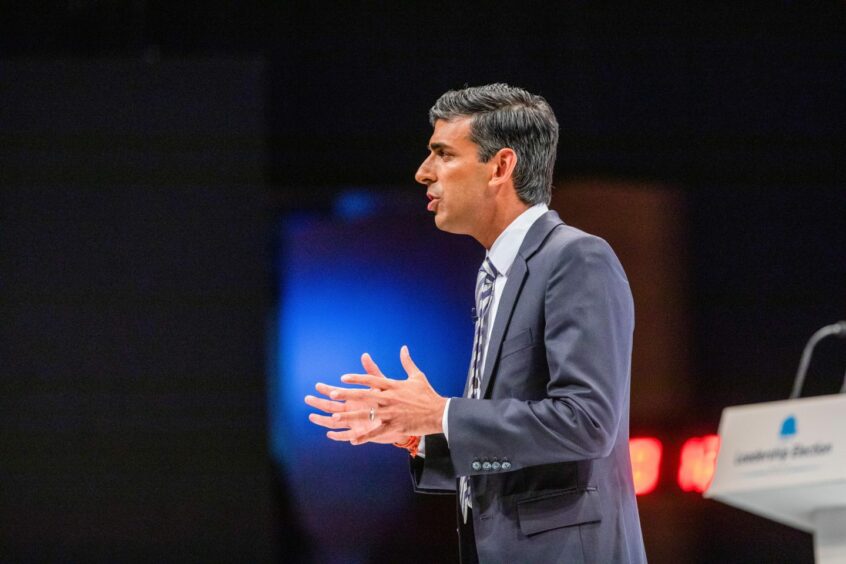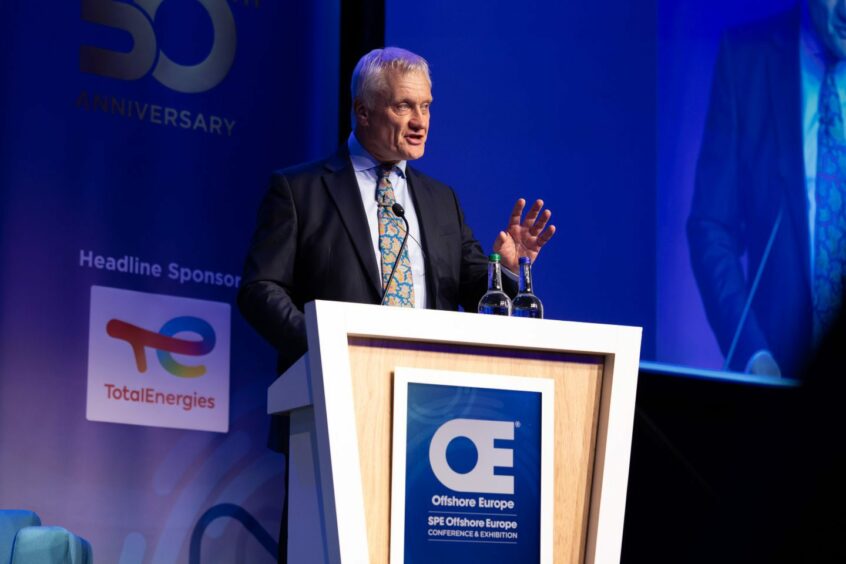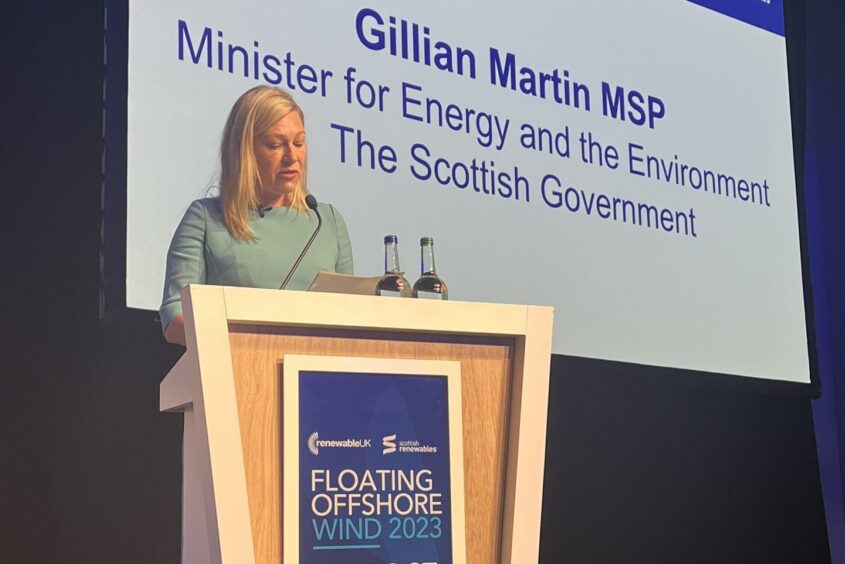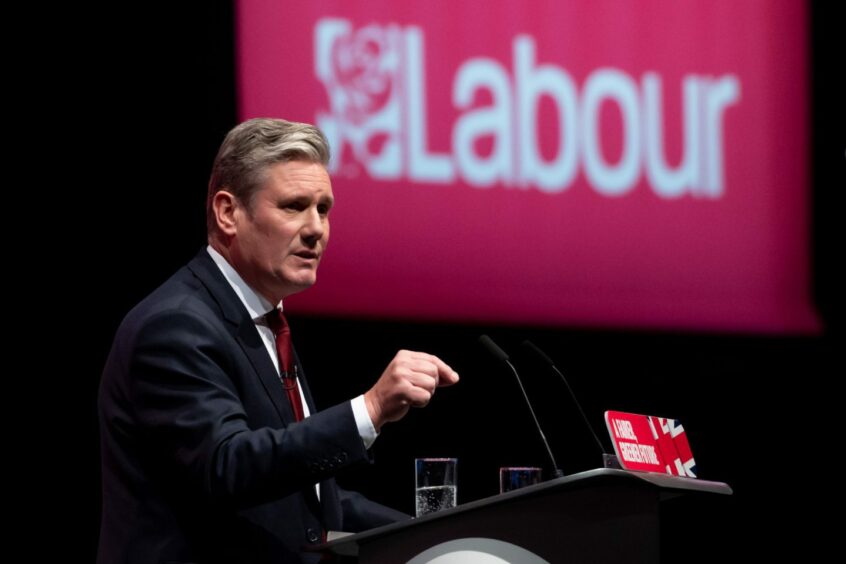
RenewableUK boss Dan McGrail slammed the recent rolling back of green policy in the UK as “perplexing” to foreign investors.
For the RenewableUK chief executive “Net zero has been politicised in the last two weeks out of nowhere and more than ever.
Mr McGrail added: “We’ve enjoyed political consensus on net zero since it was signed into law in 2019 by a Conservative government. There is championing of net zero across UK politics, in Scotland, in Wales and in Westminster.”
However, to foreign investors “this must be perplexing” says McGrail, referring to prime minister Rishi Sunak’s recent rolling back of net zero policies.
Sunak announced a rolling back for the end date on the sale of new petrol and diesel vehicles and a softening on the phasing out of gas boilers in UK homes.
Net zero an ‘obligation’ not a commitment
Day two of the Floating Offshore Wind Conference at the north-east of Scotland’s P&J Live was kicked off by the chief executive of the event organiser, RenewableUK, who explained: “Reaching net zero by 2050 in this country is the law of the land and I see no realistic path to changing that law.”
He said: “No politician can tell you authentically that they are committed to delivering net zero.”
McGrail continued: “What politicians should say when they say they are committed is that they are obliged to deliver net zero, they don’t have the luxury of being committed. It is their, our, collective duty.”
Dan McGrail said this just after the minister of state for energy security and net zero, Graham Stuart, delivered an opening speech to the Aberdeen conference via pre-recorded video.
McGrail told delegates: “There’s absolutely zero chance of any parliamentary majority to repeal the net zero law or Revert UK NDC’s [Nationally Determined Contribution] and this was evidenced by the Prime Minister’s speech, which reaffirmed commitments to offshore wind and made important commitments to grid upgrades.
“Grid upgrades are arguably the most electorally challenging parts of net zero. Yet it’s ironic that relatively popular policies like electric vehicles were weakened whilst firming up the government’s commitment to grid build-out.
“And to foreign investors, this must be perplexing so I want to reassure you that what you saw the week before last was electoral politics and not real policy change.
“I cannot with a straight face ask you not to be concerned about these idiosyncrasies of British politics, but the energy transition is happening, and it is inevitable.
“We’re going to do it anyway and this is my genuine belief that our mission is as compelling as ever, and there are a couple of very real reasons for this.
“Firstly, no politician can tell you authentically that they are committed to delivering net zero.
“Reaching net zero by 2050 in this country is the law of the land and I see no realistic path to changing that law.
“So actually what politicians should say when they say they are committed is that they are obliged to deliver net zero, they don’t have the luxury of being committed.
“It is their, our, collective duty.”
‘Bigger fish to fry’
The RenewbleUK boss said that Mr Stuart and the MP for West Aberdeenshire and Kincardine, Andrew Bowie, were invited to attend the event in person, however, Mr McGrail explained: “The Conservative Party have had bigger fish to fry this week.”
This is more than likely referring to the conservative party conference, which Mr McGrail attended on Sunday.
Dan McGrail did say he was “very grateful” to the minister of state for energy security and net zero for making his contribution to the conference.
During the first day of RenewbleUK’s event, the organisers welcomed “2300 people through the doors” representing 180 companies from 29 nations.
Mr McGrail said: “This room and the industriousness and ingenuity of the people in this room is the embodiment of what our country is striving for, it’s not that our climate ambition does not matter, they do and are at the core of our proposition.
“But it’s something deeper that connects us. This conference may be about technology, but it’s our desire to leave the world and our communities in a better state than we found it, that drives us.
“I can only really speak for myself when I make this statement but from the people that I’ve spoken to over the last couple of days and indeed from my time working in this industry, I think it’s a statement I’m prepared to defend.”
Opening the Floating Offshore Wind Conference in Aberdeen on Wednesday, Scottish energy minister Gillian Martin said the sector was a “brilliant success story so far” but that recent developments raised “serious questions” over the UK government’s ability to deliver.
The UK intends to reach 50 GW of offshore wind by 2030, including 5 GW of floating wind by the same date. However, a washout in the recent Contracts for Difference (CfD) round is likely to make achieving those goals even more challenging.
Net zero is ‘immensely popular’
McGrail said: “What you saw the week before last was electoral politics and not real policy change.
“I cannot with a straight face ask you not to be concerned about these idiosyncrasies of British politics, but the energy transition is happening, and it is inevitable.”
The “inevitable” energy transition has proved to be popular with the UK public, explained the RenewbleUK chief executive.
He said: “It is immensely popular on Monday’s renewable UK British polling data, which we had carried out by Opinion which demonstrates some interesting facts.
“As usual, the data showed that people in this country want and like net zero, over 70%.
“What’s really interesting is how they relate it to economic growth. Of the five so-called strategic industries defined by the chancellor, namely green Industries, pharmaceutical, digital creative industries and advanced manufacturing, it is green industries that people believe will deliver growth outside of the south-east and all over the UK and they have good reason for this, it’s true.”
Issues have been raised throughout this year, on the build-up to the UK’s 2024 general election, that energy has become something of a political point-scoring measure.
Earlier this year the Labour Party leader Keir Starmer said that he would prevent further licensing, instead using “existing oil and gas wells over the coming decades”.
Mr Starmer later softened his stance, saying: “Let me be clear: those who think we should somehow simply end domestic oil and gas production in Britain are wrong.”
The leader of the opposition explained “we will not be revoking any licences” meaning those already granted will be honoured.
Recommended for you


 © Supplied by Steve MacDougall / D
© Supplied by Steve MacDougall / D © Supplied by SPE Offshore Europe
© Supplied by SPE Offshore Europe © Supplied by Scottish Renewables
© Supplied by Scottish Renewables © James McCauley/Shutterstock
© James McCauley/Shutterstock